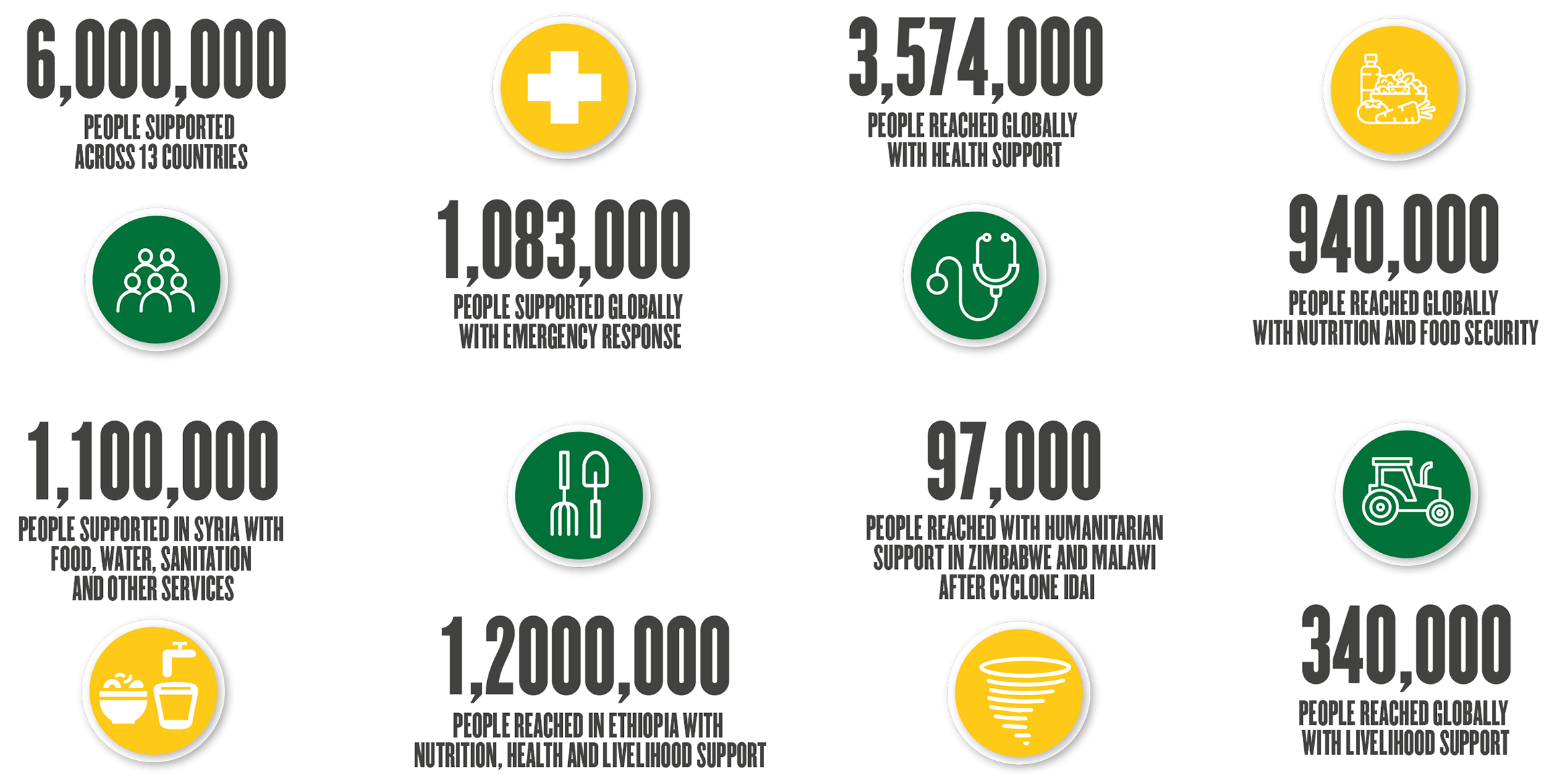Supporting Vulnerable Communities
In 2019, with the support of our generous donors, partners and the people of Ireland, GOAL reached more than six million people in need in some of the world’s poorest and most vulnerable countries.
Together, we helped change the lives of communities experiencing crises and extreme poverty through nutrition, health, livelihoods and emergency response programmes.
Our work is driven by our vision for a world where poverty no longer exists; where vulnerable communities are resilient; where barriers to well-being are removed and where everyone has equal rights and opportunities.
Where We Work
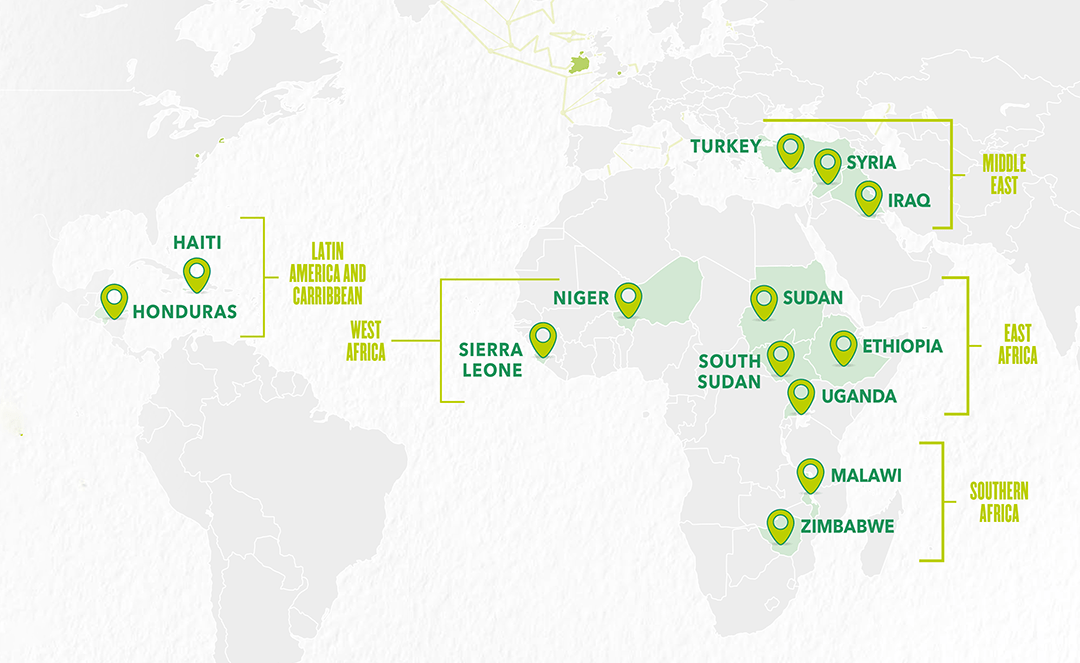
The Year in Numbers
13
countries of operation
6 million
people supported globally
940,000
people provided with food and nutrition
1,083,000
people reached through emergency response
Responding to Emergencies
Conflict and climate change continue to affect vulnerable communities, forcing millions to flee their homes. A number of countries in which GOAL works, such as Syria, South Sudan, and Ethiopia, are host to over 10 million refugees and displaced people.
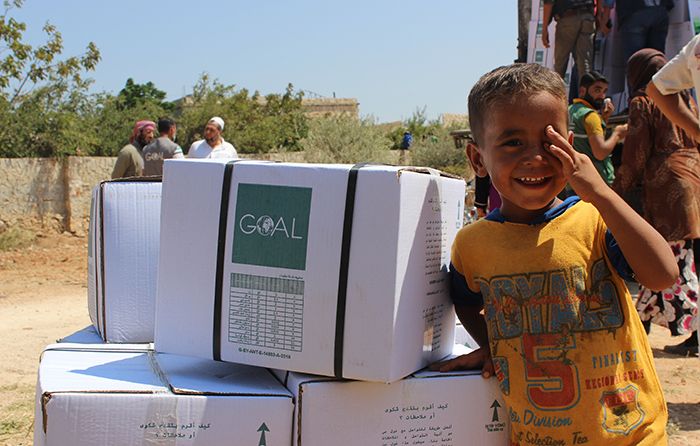
Syria
March 2019 saw the eighth anniversary of the Syrian conflict pass without any cessation of fighting. Despite the ever present threat of explosions and violence, GOAL staff continued to support over 1.1m people in the war torn country.
GOAL has played a key role establishing sanitation facilities in Idlib. And enabled markets and the availability of low cost, affordable bread through our engagement with a network of bakeries. This is supplemented by the provision of emergency food kits for local communities.
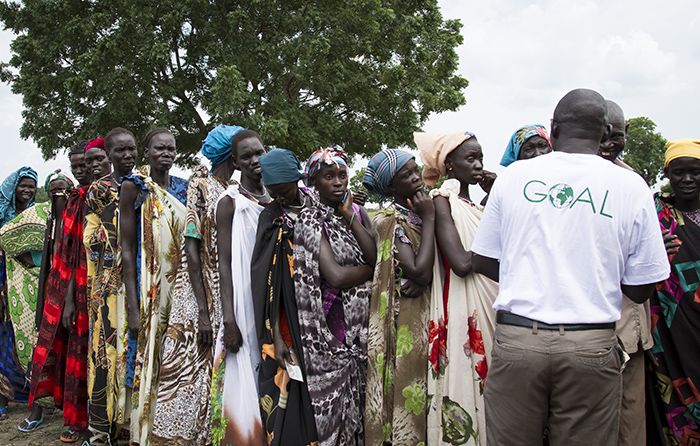
South Sudan
From June to October over one million people in South Sudan were affected by heavy flooding. Large areas of the country were devastated, with entire towns and villages submerged, and hundreds of thousands forced from their homes. Food crops were also badly affected.
GOAL reached 5,000 people with emergency health and nutritional support. The programme included support for 1,184 children under the age of five who were left displaced by the flooding.
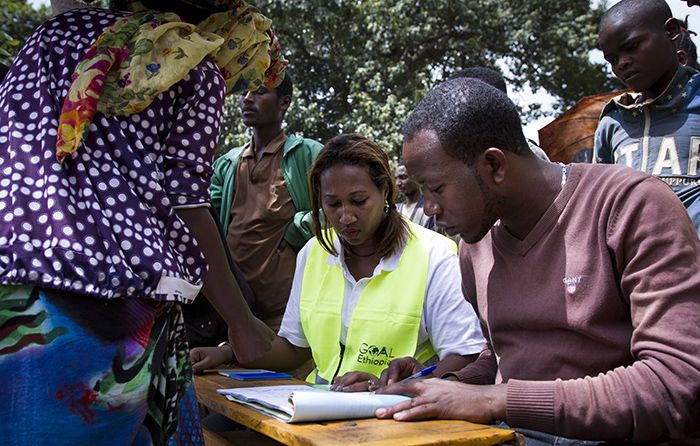
Ethiopia
GOAL’s Ethiopia programme is one of the organisation’s largest, supporting over 1.2m people in 2019. Local communities are increasingly vulnerable with seasonal climate induced shocks, a large refugee population, and regional conflict.
In 2019, GOAL reached 67,357 beneficiaries through emergency shelter, cash, and non-food items. And over 698,730 children and
women suffering from moderate and severe acute malnutrition received support.
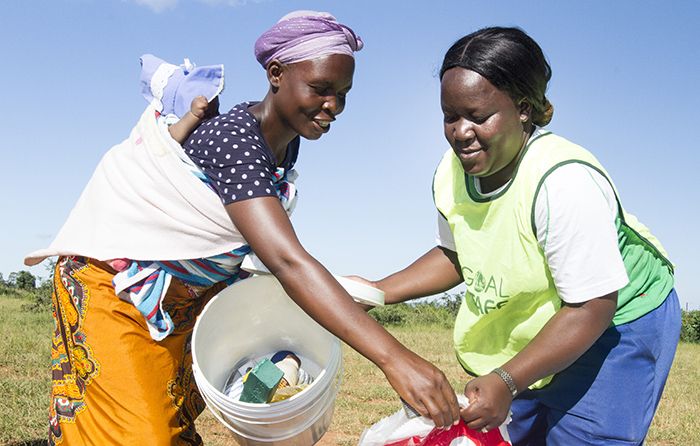
Cyclone Idai
Last March, the most powerful storm on record in Southern Africa wreaked devastation across much of region. GOAL swiftly responded within 48 hours of the cyclone’s impact in Malawi and Zimbabwe.
Communities were provided with shelter, medical assistance and hygiene kits to help alleviate suffering. Focusing on recovery, GOAL also provided agricultural assistance to flood-affected farming households.
Partnership is the most valuable tool we have in arriving at better outcomes for the world's most vulnerable communities.
Anne O’Leary, GOAL Chairperson
Improving Health
In 2019, GOAL delivered quality and accessible health services to vulnerable people, enabling them to care for their own health and helping local providers supply the essential care needed to facilitate the communities they serve.
Highlights
- Over 1.7 million people were reached with health interventions across 13 countries
- 64 Water Stations were supported by GOAL in 2019, providing more than 800,000 people with at least 25 litres of safe drinking water every day
- GOAL Niger worked with more than 21,000 mothers on family mid-upper arm circumference band (muac) screening to identify and treat malnutrition
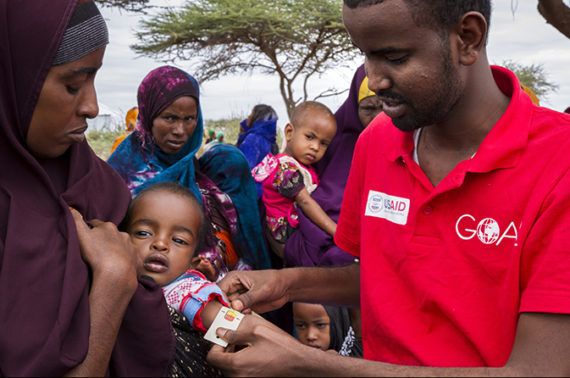
Omar's Story
Omar, his wife Rima, and their seven children were forced to leave their village in southern Idlib province in Syria due to shelling and explosions in 2019. Like many of Syria’s displaced, their journey over four months was dangerous and exhausting. Unsure and fearful of what the future would hold for them, they took refuge in a camp in Rabeeta Village, in northern Idlib province.
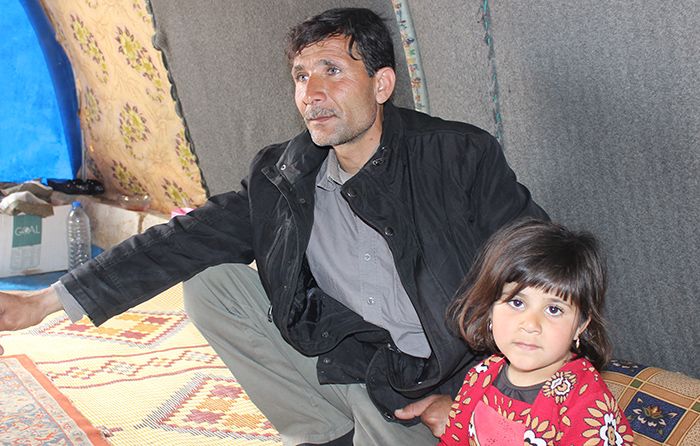
According to Omar, securing safe water for the family was their biggest challenge. “We feared our children would get infectious and contagious diseases. We had no idea if the water available was drinkable or polluted."
With frequent outages in the public water network within Idlib province, the family, like thousands of others, relied on water collected from wells and delivered to the camp via trucks. The price often exceeded what most could pay, forcing some families to spend up to 40% of their income.
Trucks are the only source of water for around 45% of the population in Idlib. In order to reduce this reliance on water supplied by trucks and sold at an exploitative price, GOAL’s WASH programmes in Idlib focuses on repairing damaged water infrastructure and supporting the maintenance of water stations.
Omar’s family is one of 110 displaced families who benefited from the clean running water provided by GOAL’s programmes in the camp in Rabeeta Village. Now Omar and his family have a reliable, safe and clean water source. Crucial for the family to maintain hygiene standards and to prevent the spread of disease.
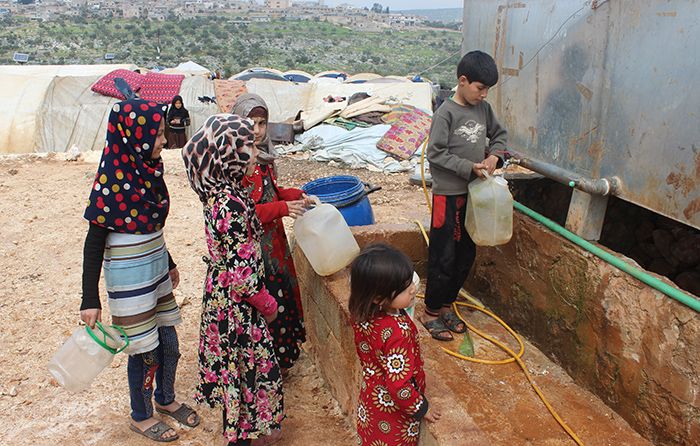
I have seen first-hand the struggles of people and how a helping hand can make real change in someone’s life
Jorge Tejeda, GOAL Honduras
Providing Food and Nutrition
Nearly 800 million people globally do not to have had enough food to meet their basic nutritional needs. The world’s demand for food is increasing against a background of population growth, conflict, migration and climate change.
Last year GOAL teams provided nutritional support to 939,000 people and we continued to focus on innovative and sustainable ways to achieve food and nutrition security for the most vulnerable.
Programme support focused on:
- providing and promoting adequate diets in communities
- enhancing subsistence food production and commercial food production
- delivering market access and making nutritionally diverse foods available
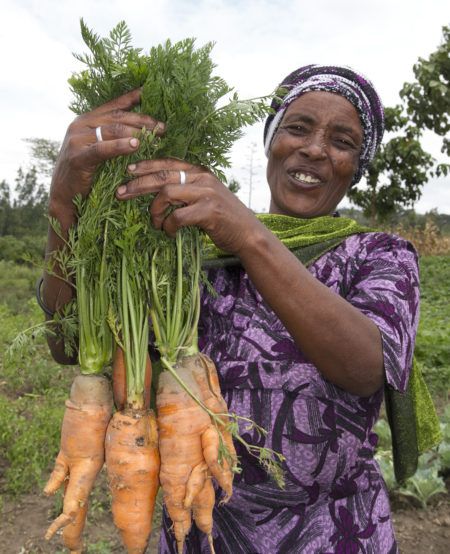
Baby Kuthekur's Story
Kuthekur's mother Mary felt blessed when Kuthekur was born. Mary has had six children but tragically lost four due to illness and disease.
Mary, who was HIV positive, fled from the Upper Nile State in South Sudan when her home came under attack in 2014. She was so sick on her journey that a relative had to carry her for eight hours to the Ethiopian border, where she was rushed to hospital in Gambella for medical attention. Mary remained in hospital for six months with her eldest son acting as her primary carer. When Mary became pregnant with Kuthekur, she was provided with antiretroviral drugs which meant that Kuthekeur was born HIV negative at Turkedi refugee camp in Gambella.
However, he was considerably smaller than the average baby due to his mother’s poor physical condition throughout the pregnancy. When Kuthekur first came to the C-MAMI programme in the camp, he was identified as a high-risk infant.
His condition was worse than first suspected and he was immediately transferred to Gambella hospital for more intensive treatment for two weeks. Worringly, at one month old, Kuthekur weighed just 2.6kg – almost half the weight of the average baby his age.
Thankfully, over the course of his treatment Kuthekur's health gradually improved. After months of worry for Mary, Kuthekur is back on track to meet his developmental milestones. And having benefitted from the continued support of an outpatient therapeutic programme, Kuthekur is now a bubbly, smiling little boy.
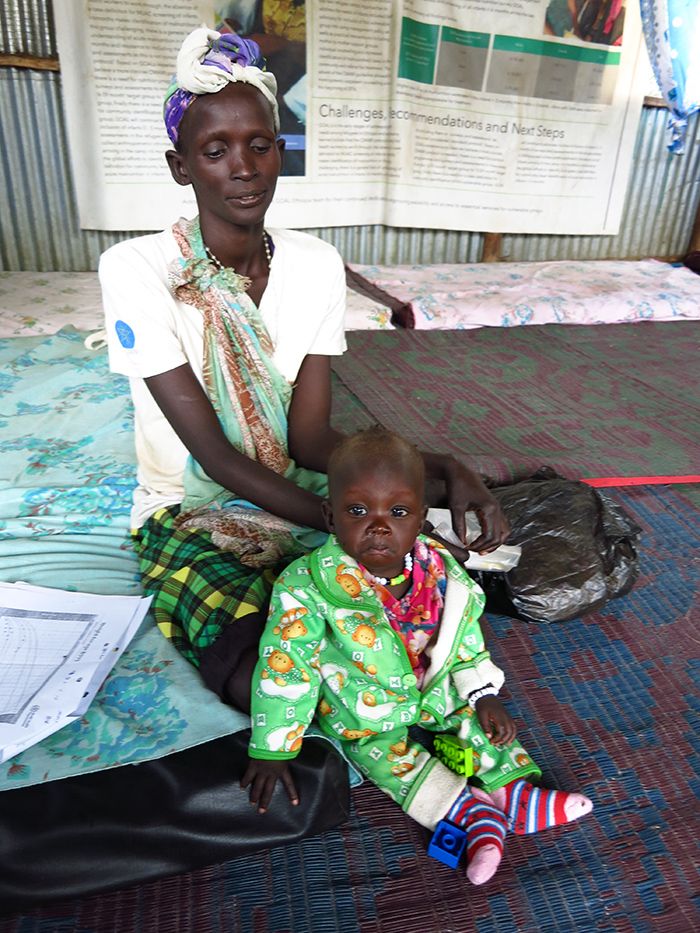
The same character is on display each and every day - that of passion and compassion; that of resilience imbued with hope; that of humanity and solidarity; and that of professionalism and composure, often in the most challenging of contexts.
Siobhan Walsh, GOAL CEO
Supporting Sustainable Livelihoods
In 2019, GOAL supported 338,000 people through our sustainable livelihood programmes, focusing on the development of resilient livelihoods by giving people what they needed to create and maintain a living.
GOAL worked in communities where livelihoods were often within the informal economy and typically characterised by low and unstable income and an inability to access institutional support and credit.
Highlights
- GOAL's DYNAMIC programme supported over 47,000 young people in Uganda providing education, financial inclusion, business development skills and private sector engagement
- Our team in Honduras helped to open up market access for over 3,500 small-scale fisheries and provided practical training leading to employment for over 220 men and women
- GOAL's PROSPER programme in Malawi worked with more than 10,000 farmers to promote resilient climatesmart agriculture
- The RECOVER programme worked with local communities in South Sudan to improve food security and livelihood opportunities for 148,000 people
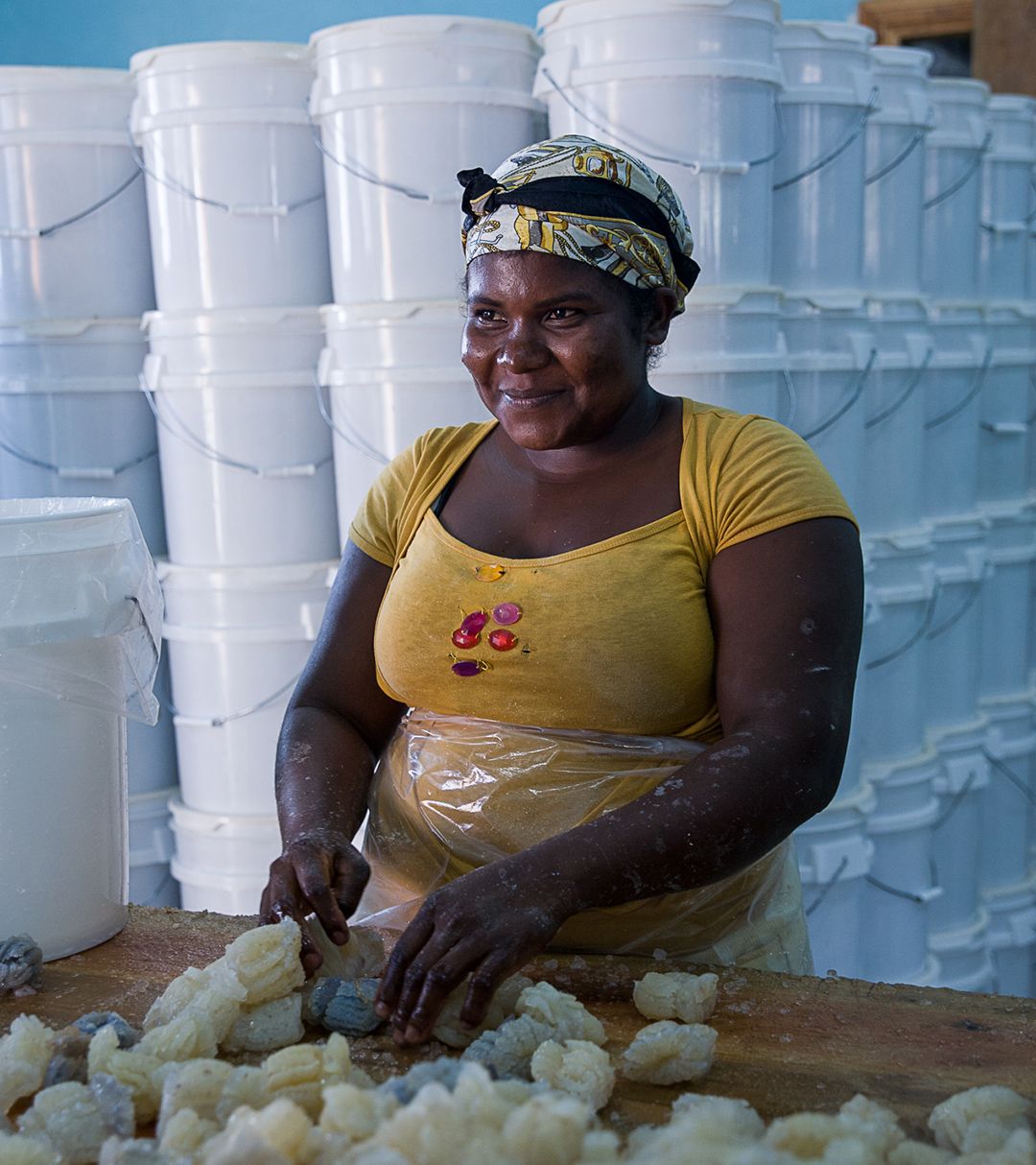
Taha's Story
Taha fled his home in Nortern Iraq with his wife and their four children, and relocated to Derkar after Sinjar was invaded and occupied by militants. While he was grateful for the safety his family had found, Taha, now had no job or means of livelihood.
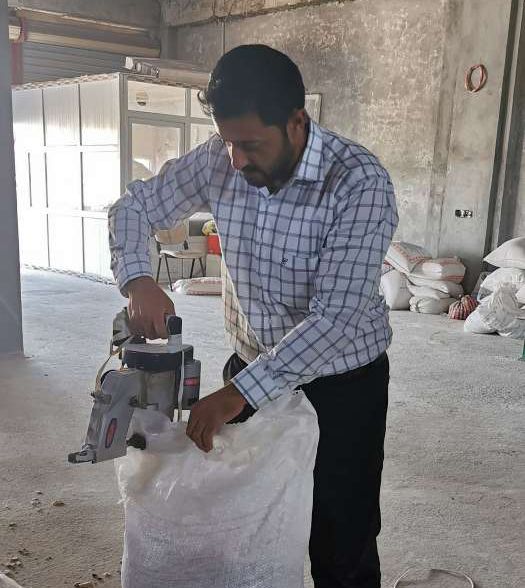
Through GOAL, Taha was offered training and a small grant to help him start a business. With no animal feed being produced in Derkar, Taha saw an opportunity and used the training to set up his own animal feed production business. “I had experience of producing animal feed and the small business training that GOAL provided filled the gaps in my knowledge. It basically helped me to think like a businessman and to consider the communities needs in order to establish a sustainable business.”
“I never thought an internally displaced person like me with a very small chance of earning an income could have a business and be able to support and help my small family, and now my second bigger family – the Derkar people who have welcomed me to their community. I’m beyond happy to help them in my own way.”
Today Taha's business is thriving with customers flocking from nearby towns and villages. In total 444 entrepreneurs benefited from GOAL's Iraqi livelihoods programming in 2019.
We must unequivocally recognise that gender equality is a right and not a gift.
President Michael D Higgins
Supporting Gender Equality
GOAL has a longstanding commitment to gender equality, and we adopt a 'gender lens' in everything we do. We believe gender equality is critical to achieving poverty reduction, food security, more peaceful and inclusive communities and enhancing human capital through health and education.
Highlights
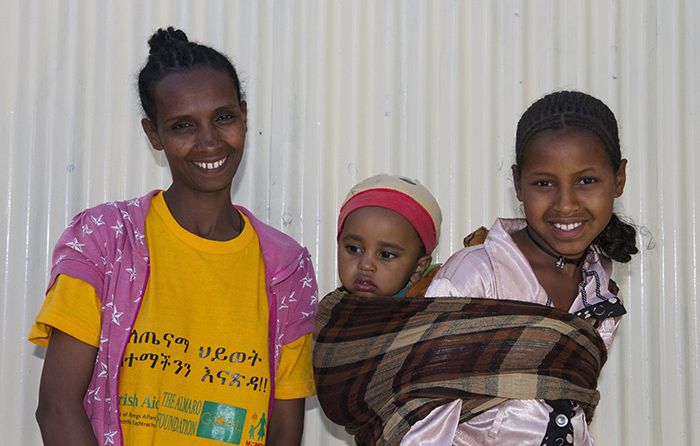
Hiwot Fikadu poses with her two children. Hiwot runs a small business of selling coffee with support from GOAL’s ChildSPACE programme in Addis Ababa, Ethiopia.
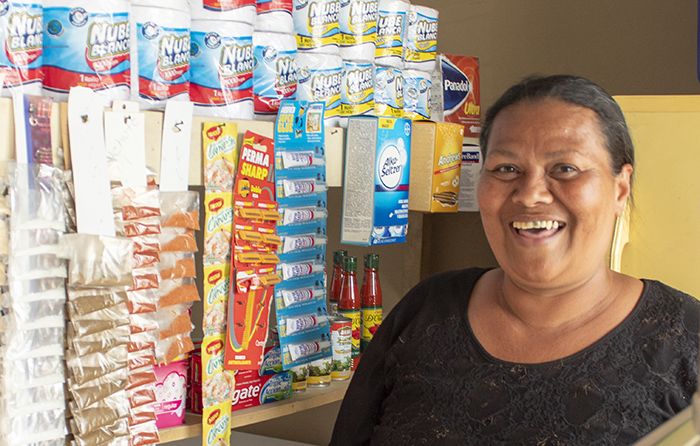
Denia Bonilla, from the Jose Arturo Duarte neighbourhood outside Tegucigalpa, stands in her local grocery store which she runs supported by GOAL’s Barrio Resiliente programme.
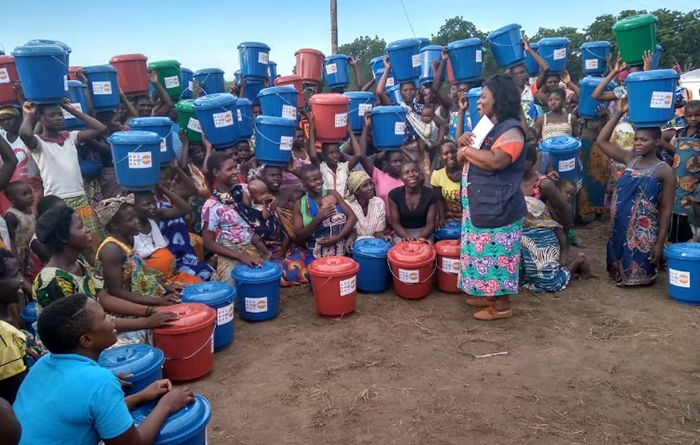
Hygiene dignity kits are distributed to women and girls at an IDP camp in Nsanje district, Malawi, following floodings in March 2019.
Impact in Numbers
